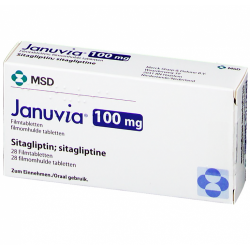Januvia (sitagliptin) Coupons, Discounts & Cost
Januvia is a hypoglycemic agent containing sitagliptin. One way to save money on the Isordil (isosorbide dinitrate) is a drug from the group of organic nitrates for oral use. retail cost regardless of income and insurance status is to use Isordil coupons or discount cards from RXCoupons. Use our Isosorbide Dinitrate coupons at your online pharmacy and receive up to 75% off the sale price each time you refill your prescription.
Januvia (sitagliptin) useful information for patients
Januvia is a hypoglycemic agent containing sitagliptin. This drug is used for the treatment of type 2 diabetes. As for the chemical structure and pharmacological activity, Sitagliptin greatly differs from insulin, sulfonylureas, biguanides, PPAR-gamma agonists, alpha-glucosidase inhibitors, amylin analogues.
Sitagliptin enhances glucose-dependent insulin secretion and reduces the secretion of glucagon. This substance reduces plasma glucose levels in patients with type 2 diabetes.
Compared with younger patients, the concentration of sitagliptin in older patients (65-80 years) is higher by approximately 19%. Januvia doses do not need to be adjusted in elderly patients.
Learn about indications for Januvia (sitagliptin)
The drug is used as monotherapy to improve glycemic control in patients with type 2 diabetes.
Januvia in combination with metformin is indicated in patients with type 2 diabetes to improve glycemic control (as initial therapy or when diet and physical activity do not result in adequate glycemic control).
Januvia in combination with sulfonylureas is indicated for patients with type 2 diabetes to improve glycemic control (when diet and physical activity do not result in adequate glycemic control).
Januvia can be also combined with PPARγ agonists for the treatment of patients with type 2 diabetes mellitus (when diet and physical activity do not result in adequate glycemic control).
Januvia can be combined with insulin for the treatment of patients with type 2 diabetes (with or without metformin) in those cases where diet and exercise do not result in adequate glycemic control.
Precautionary measures to take with Januvia (sitagliptin)
Januvia should not be used in case of hypersensitivity to any component of the drug. The drug is not used during pregnancy, breastfeeding. It is contraindicated in patients with type 1 diabetes, diabetic ketoacidosis. The drug is not for children under the age of 18.
Treatment should be interrupted in case of renal impairment. Patients with moderate and severe renal insufficiency (as well as patients with end-stage renal disease requiring hemodialysis or peritoneal dialysis) should reduce the dose of the drug.
Patients should be informed of the symptoms of acute pancreatitis (severe abdominal pain). The clinical manifestations of pancreatitis disappear after discontinuation of sitagliptin. It is necessary to stop the therapy if pancreatitis is suspected.
Like other oral hypoglycemic agents, Januvia is not recommended for use during pregnancy. The drug should not be administered during lactation.
Januvia (sitagliptin) dosage and administration
Patients should use 100 mg once a day (Januvia is used alone or in combination with metformin, sulfonylureas, PPARγ agonists or insulin (with or without metformin). The drug can be taken regardless of meals.
If the patient has missed the dose, the next dose should be taken as soon as possible. Do not double the dose of the drug (do not take two doses in the same day).
Patients with mild renal insufficiency should not change the dose of the drug. Patients with moderate renal impairment should take 50 mg once a day. Patients with severe renal failure or with end-stage renal disease requiring hemodialysis or peritoneal dialysis should take 25 mg 1 time per day.
Patients with mild to moderate hepatic insufficiency should not change the dose of the drug. The drug has not been studied in patients with severe hepatic insufficiency.
Elderly patients should not change the dose of the drug.
How to recognize Januvia (sitagliptin) side effects?
The most common adverse reactions include: nasopharyngitis, allergic reactions were (equal frequency in patients treated with Januvia as monotherapy or as part of combination therapy). CNS: the most common side effects were dizziness and excessive sleepiness. Digestive tract: dyspeptic syndrome, bloating, stool disorders, discomfort in the upper abdomen. Rare side effects include: arthralgia, myalgia, hyperuricemia, low levels of ALP, leukocytosis.

